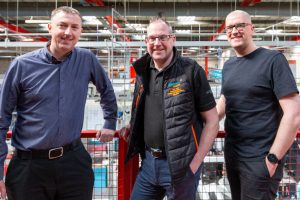Resilient Thos Storey eyes new markets – special report

STEEL fabricator Thos. Storey Fabrications is moving into higher margin work producing agricultural equipment.
The Manchester firm, which makes parts for JCB, Caterpillar and Terex, has secured the licence for the UK and parts of Europe to make and distribute Spread-a-Bale, a trailer that spreads hay bales, pictured below.
In 2012 it sold 130, rising to 200 this year, a small part of the group’s £10m revenue which is still 60% dependent on its contracts with construction-related vehicle manufacturers, although this is down from 90% in 2007.
But owners John Huggins and Fred Ellis are determined to continue to diversify the firm’s customer base after enduring a torrid time when the recession hit the construction industry. Staff numbers fell from a peak of 290 to 90 and have since climbed back up to 140.
Mr Huggins said: “We’re breaking into agriculture. At the end of the day we’re in one of the fiercest market places because what we do is also done by the Indians, the Chinese and the Brazilians. We’ve been fighting hard to find new sectors and to make greater efficiencies.
“In the last few years we’ve won work back from Eastern Europe. We’re more efficient and one of the greatest levellers for us is transport costs. Oil is high in price which means it’s expensive to move things over a great distance on the back of trucks, and that gives us an opportunity to compete.”
It’s a capital intensive industry that requires expensive welding robots of around £200,000 each, powder coating equipment and laser cutting machinery, which can cost up to £500,000.
And yet there is always the pressure to keep costs down in an environment where margins are low. Steel tanks which hold the hydraulic fluid required for JCB vehicles leave the factory priced at £230 each, but Thos Storey only makes about £8 on each one, a margin of 3.4%.
“That’s the sector we’re in. This year we’ll probably break even and next year it’ll be a profit. This is the worst recession but we’ve been through a few ups and downs. We’ve always been heavily involved in construction and it hit the buffers. So we’ve been finding other markets to get a better mix of the business and we’re slowly achieving it.”
The business has also won orders with the vehicle manufacturer Dennis to supply large steel barriers that are attached to a hydraulic arm to push waste out of rubbish trucks.
The company has its origins in Thomas Storey Engineers, a Stockport firm established in the 1930s which made agriculturual equipment and bridges. By the 1990s, after several buyouts, it was based in Reddish making containers and carrying out steel fabrication.
The container market collapsed in the mid-1990s and the firm’s investors wanted to sell up, presenting Huggins and Ellis – who were the production and finance directors respectively – with an opportunity to buy out the fabrication business. They went on to build revenues from £3.5m to a peak of £27m in 2007 and relocated to a 110,000 sq ft purpose-built factory close to the Etihad Stadium. During the same period manufacturing’s share of UK GDP halved to around 11%.
Orders dried up when the construction industry went into recession but the business cut back on staff and scraped through, largely due to its lack of debt, according to Mr Huggins.
“If we had had huge borrowings we would not have survived,” he said. “The vast majority of the finance going through this building has been through asset finance, we’ve never had borrowings against the business and I think that’s how we’ve survived.” he said. “We’re old fashioned, cash is king. It’s all about preservation of cash. Have you got the money to pay the bills? If you haven’t, don’t buy it.”
Mr Huggins is optimistic for the firm’s prospects after weathering the downturn but is wary of several issues – energy prices and skills.
“Energy bills are my biggest concern. We consume huge amounts of power. Each year the increases are eye watering and there’s no stability. The market is so volatile the best you can do is a 12-month fix.
“Skills are a problem. To try and recruit people is a huge problem. We can take people with the basic skills and train them to a skills base we can use, but it’s difficult to find people and retain them. You see the unemployment figures in the news but there are jobs available.”
The company is about to embark on an apprenticeship programme but human resources manager Jo Lynch believes there needs significant change to the apprenticeship system before it is seen as a credible path by many young people.
“The apprenticeship in engineering needs to be taken up several notches,” she said. “It can’t be the same as hairdressing or business administration. This is one of the reasons why we see so few people choosing apprenticeships rather than university.”










